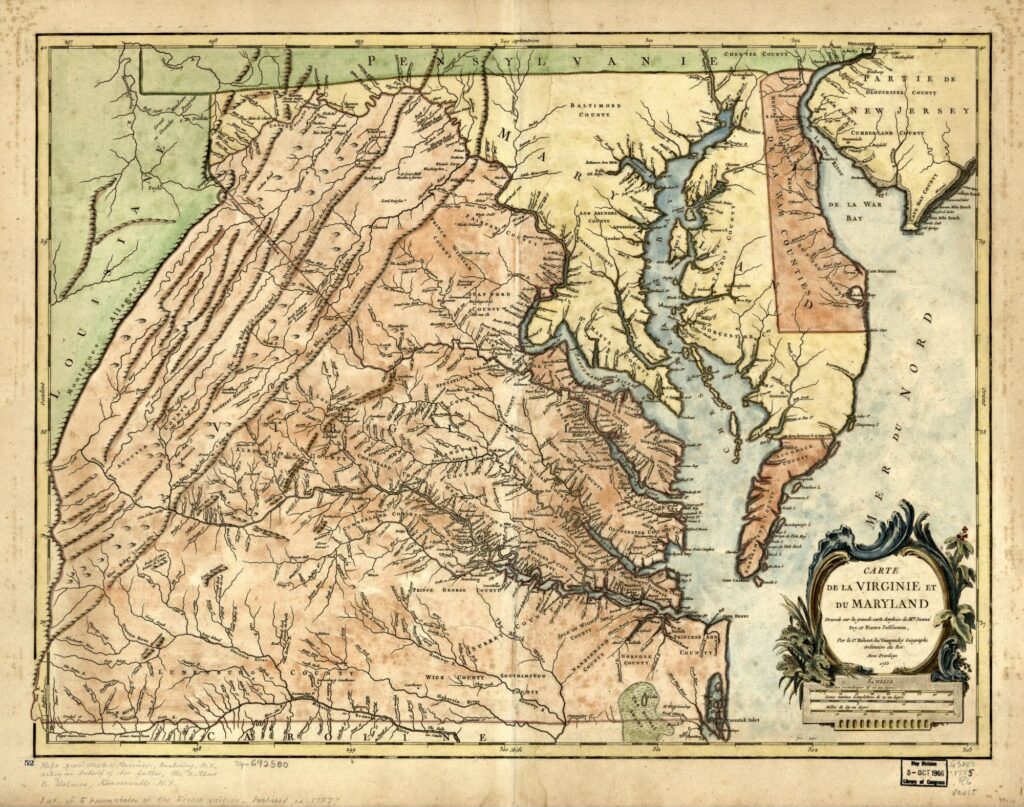Source: Thomas Jefferson, Notes on the State of Virginia (London: John Stockdale, 1787), 45-49. https://teachingamericanhistory.org/het6.
Query 6: Productions mineral, vegetable, and animal
...Near the eastern foot of the North mountain are immense bodies of Schist, containing impressions of shells in a variety of forms. I have received petrified shells of very different kinds from the first sources of the Kentucky, which bear no resemblance to any I have ever seen on the tide-waters. It is said that shells are found in the Andes, in South-America, fifteen thousand feet above the level of the ocean. This is considered by many, both of the learned and unlearned, as a proof of an universal deluge. To the many considerations opposing this opinion, the following may be added. The atmosphere, and all its contents, whether of water, air, or other matters, gravitate to the earth; that is to say, they have weight. Experience tells us, that the weight of all these together never exceeds that of a column of mercury of 31 inches height, which is equal to one of rainwater of 35 feet high. If the whole contents of the atmosphere then were water, instead of what they are, it would cover the globe but 35 feet deep; but as these waters, as they fell, would run into the seas, the superficial measure of which is to that of the dry parts of the globe as two to one, the seas would be raised only 52 1/2 feet above their present level, and of course would overflow the lands to that height only. In Virginia this would be a very small proportion even of the champaign country, the banks of our tide waters being frequently, if not generally, of a greater height. Deluges beyond this extent then, as for instance, to the North mountain or to Kentucky, seem out of the laws of nature. But within it they may have taken place to a greater or less degree, in proportion to the combination of natural causes which may be supposed to have produced them. History renders probable some instances of a partial deluge in the country lying round the Mediterranean sea. It has been often supposed, and is not unlikely, that that sea was once a lake. While such, let us admit an extraordinary collection of the waters of the atmosphere from the other parts of the globe to have been discharged over that and the countries whose waters run into it. Or without supposing it a lake, admit such an extraordinary collection of the waters of the atmosphere, and an influx of waters from the Atlantic ocean, forced by long continued Western winds. That lake, or that sea, may thus have been so raised as to overflow the low lands adjacent to it, as those of Egypt and Armenia, which, according to a tradition of the Egyptians and Hebrews, were overflowed about 2300 years before the Christian aera; those of Attica, said to have been overflowed in the time of Ogyges, about 500 years later; and those of Thessaly, in the time of Deucalion, still 300 years posterior. But such deluges as these will not account for the shells found in the higher lands. A second opinion has been entertained, which is, that, in times anterior to the records either of history or tradition, the bed of the ocean, the principal residence of the shelled tribe, has, by some great convulsion of nature, been heaved to the heights at which we now find shells and other remains of marine animals. The favourers of this opinion do well to suppose the great events on which it rests to have taken place beyond all the areas of history; for within these, certainly none such are to be found: and we may venture to say further, that no fact has taken place, either in our own days, or in the thousands of years recorded in history, which proves the existence of any natural agents, within or without the bowels of the earth, of force sufficient to heave, to the height of 15,000 feet, such masses as the Andes. The difference between the power necessary to produce such an effect, and that which shuffled together the different parts of Calabria in our days, is so immense, that, from the existence of the latter we are not authorised to infer that of the former.
M. de Voltaire has suggested a third solution of this difficulty (Quest. encycl. Coquilles). He cites an instance in Touraine, where, in the space of 80 years, a particular spot of earth had been twice metamorphosed into soft stone, which had become hard when employed in building. In this stone shells of various kinds were produced, discoverable at first only with the microscope, but afterwards growing with the stone. From this fact, I suppose, he would have us infer, that, besides the usual process for generating shells by the elaboration of earth and water in animal vessels, nature may have provided an equivalent operation, by passing the same materials through the pores of calcareous earths and stones: as we see calcareous dropstones generating every day by the percolation of water through lime-stone, and new marble forming in the quarries from which the old has been taken out; and it might be asked, whether it is more difficult for nature to shoot the calcareous juice into the form of a shell, than other juices into the forms of chrystals, plants, animals, according to the construction of the vessels through which they pass? There is a wonder somewhere. Is it greatest on this branch of the dilemma; on that which supposes the existence of a power, of which we have no evidence in any other case; or on the first, which requires us to believe the creation of a body of water, and its subsequent annihilation? The establishment of the instance, cited by M. de Voltaire, of the growth of shells unattached to animal bodies, would have been that of his theory. But he has not established it. He has not even left it on ground so respectable as to have rendered it an object of enquiry to the literati of his own country. Abandoning this fact, therefore, the three hypotheses are equally unsatisfactory; and we must be contented to acknowledge, that this great phaenomenon is as yet unsolved. Ignorance is preferable to error; and he is less remote from the truth who believes nothing, then he who believes what is wrong.


































































































































































